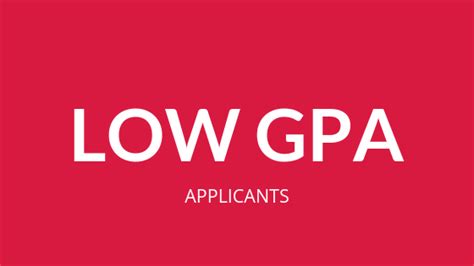Physician Assistant (PA) programs have become increasingly competitive, leaving many aspiring healthcare professionals with low GPAs disheartened about their chances of admission. However, there are still a number of low GPA PA programs that offer students a path to achieving their career goals.

Statistics: The Challenge of Low GPAs
According to the Physician Assistant Education Association (PAEA), the average GPA for PA program applicants in 2022 was 3.7. This means that students with GPAs below 3.7 are at a significant disadvantage when applying to PA programs.
The Importance of Perseverance
Despite the challenges, it’s crucial to remember that a low GPA does not have to be a permanent obstacle. With perseverance and a willingness to improve, students can increase their chances of admission to a PA program.
Low GPA PA Programs: A Detailed Guide
Here is a comprehensive guide to finding and applying to low GPA PA programs:
1. Research and Identify Programs:
- Visit the PAEA website and search for programs with a “low GPA requirement.”
- Consider factors such as program size, location, and curriculum.
2. Strengthen Your Application:
- Improve your GPA by taking additional coursework or retaking classes with lower grades.
- Gain relevant healthcare experience through volunteering, shadowing, or working as a CNA.
- Prepare for the GRE and strive for a competitive score.
3. Write a Compelling Personal Statement:
- Explain the reasons for your low GPA and how you have overcome challenges.
- Highlight your passion for healthcare and your commitment to becoming a Physician Assistant.
4. Seek Letters of Recommendation:
- Ask professors, supervisors, or mentors to write letters that attest to your work ethic, motivation, and potential as a healthcare provider.
5. Apply Strategically:
- Apply to multiple low GPA PA programs to increase your chances of admission.
- Consider applying to programs with rolling admissions or extended deadlines.
Tips and Tricks for Success
- Network with PA professionals: Attend conferences, meet with alumni, and seek out mentors who can provide guidance and support.
- Join professional organizations: The PAEA and the American Academy of Physician Assistants (AAPA) offer resources, networking opportunities, and professional development.
- Stay informed: Keep up-to-date with changes in PA education, admission requirements, and healthcare trends.
Pros and Cons of Low GPA PA Programs
Pros:
- Offer a pathway to a PA career for students with lower GPAs.
- Provide support and resources to help students improve their academic standing.
- Offer a range of program options to meet individual needs.
Cons:
- Acceptance rates may be lower than those of programs with higher GPA requirements.
- May require additional coursework or remediation to meet graduation requirements.
- May not offer the same level of prestige or competitive advantages as programs with higher GPA requirements.
4 Low GPA PA Programs You Should Know About
| Program | GPA Requirement | Location |
|—|—|—|
| Campbell University | 3.0 | Buies Creek, NC |
| Shenandoah University | 3.0 | Winchester, VA |
| Touro College | 3.0 | New York, NY |
| University of Lynchburg | 3.0 | Lynchburg, VA |
Conclusion
Getting into a PA program with a low GPA requires resilience, determination, and a willingness to go the extra mile. By researching, strengthening your application, and applying strategically, you can increase your chances of admission to a low GPA PA program and embark on a rewarding career as a Physician Assistant.
